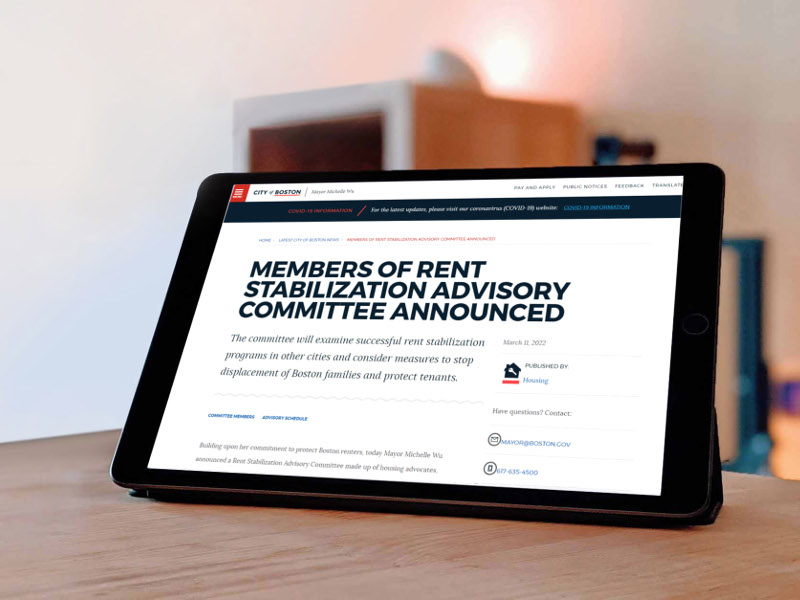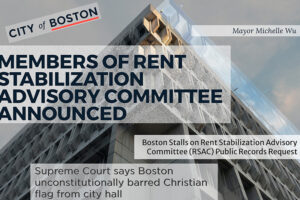Boston Stalls on Rent Stabilization Advisory Committee (RSAC) Public Records Request
By Peter Vickery, Legislative Affairs Counsel
RSAC Public Records Request Filed and Not Answered
On March 28, 2022, on behalf of MassLandlords, Inc., I submitted a public records request through the city of Boston’s portal regarding the recently formed Rent Stabilization Advisory Committee (RSAC). I received an automatic acknowledgement of receipt. Here is what I asked for.
- The decision to establish the Mayor’s Rent Stabilization Advisory Committee (RSAC);
- Solicitation of suggestions for potential members of the RSAC, including but not limited to, the content of all press releases, op-eds, letters to the editor, advertisements, emails, text messages, chat messages and robocalls;
- Selection of the members of the RSAC, including a sample authorization to complete background checks, lists of materials required, and scoring sheets or rubrics to evaluate candidates;
- All invitations to join the RSAC, including the manner (email, letter, phone call, text messages, app messages or other) and the content of each and every invitation;
- For the period March 11, 2021, through March 15, 2022, all emails to, from or cc’ing city email systems in connection with each of the following, either de-duplicated or not, whichever way requires less work... (then I listed the email addresses of all the committee members).
The Public Records Law requires that agencies must respond to public records requests within 10 business days. The agency must produce the records or provide a “reasonable timeframe,” not to exceed 15 business days.
Exactly 10 business days after I submitted the request, on April 11, 2022, I received an email from the city stating that “the City will review your request and will provide a response once the review of your request is complete.” The response falls far short of what the Public Records Law requires. I replied, pointing this out.
If the City had simply responded with the customary response of agencies when they receive records requests that will take a while to respond to, e.g. “we will need 15 days to turn this around,” I would not have been surprised. But saying “we will provide a response once the review of your request is complete” is a little out of the ordinary.
On April 12, 2022, I submitted an appeal petition to the Supervisor of Public Records. We at MassLandlords will keep you posted on what happens next.

MassLandlords’ public records request will show how the Rent Stabilization Advisory Committee came to be announced with no small landlords represented. Derivative of image licensed by Unsplash.
Editorial Comments on the Rent Stabilization Advisory Committee
Mayor Michelle Wu’s rent stabilization committee has just one job, which is to come up with a blueprint for rent control.
On the one hand, this provides a welcome example of honesty in politics. Nobody makes any pretense that the committee will consider whether rent control is a good idea. It will not engage in an independent, deep-diving, wide-ranging policy analysis that might lead it to recommend something other than rent control. The committee will not have the task of determining whether rent control might, just possibly, once again prove to be the category-5, 10-megaton debacle that it has been every other time that anybody anywhere has tried it. No, the committee’s founding principle is an unshakeable, unquestioning faith in the efficacy of rent control, the conviction that this time will be completely different from every other time.
The committee embodies what I have come to think of as the Homer Simpson Doctrine of Public Policy. To see what I mean, click here to watch Homer Simpson up the utility pole attempting to obtain free power by repeatedly sticking a cable into the transformer sockets. Trying the red socket proves nearly fatal, so “let’s try the red one again,” says Homer, with obvious consequences.
So while we think the policy is wrong (very, very wrong), we welcome the honesty about the committee’s purpose. But on the other hand, the mayor needs to be open about how certain people ended up on the committee. Yes, elected officials are free to choose their advisors. But when a public servant gives the task of drafting important legislation to volunteers on an informal committee (one to which the Open Meeting Law does not necessarily apply), the public deserves to know about the selection process. Who received an invitation to join the committee and why? These things are not supposed to happen in the shadows.
Fortunately, in Massachusetts, we have the Public Records Law, which is supposed to help let in the sunshine. We have appealed to the city of Boston to get vital information about a committee that could make choices that will negatively impact Massachusetts for generations. To allow the public to remain in the dark on the origins of RSAC would be unconscionable.
Members are the primary support for our policy work.





